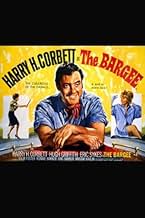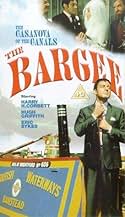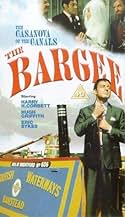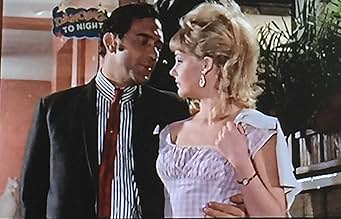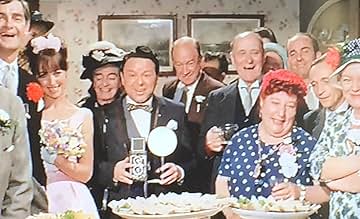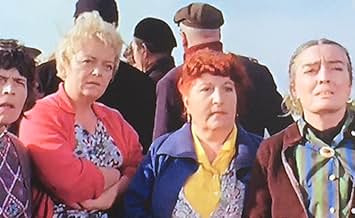A lock-keeper entrusts his daughter with a canal Casanova, and she soon falls pregnant. He refuses to open his locks until the guilty party confesses.A lock-keeper entrusts his daughter with a canal Casanova, and she soon falls pregnant. He refuses to open his locks until the guilty party confesses.A lock-keeper entrusts his daughter with a canal Casanova, and she soon falls pregnant. He refuses to open his locks until the guilty party confesses.
- Cynthia
- (as Jo Rowbotham)
- Self - Announcer
- (voice)
- Bargee
- (uncredited)
- Pub Patron
- (uncredited)
Featured reviews
He wouldn't and doesn't want to change this way of life until the inevitable intervenes.
Honourable mentions to Ronnie Barker, Julie Foster and Hugh Griffiths.
It depicts a way of life and attitudes that have long since gone and is enjoyable because of this.
The bargees are workmen, Hemel (Corbett) the ladies man trapped by a pretty girl, and propelled to the altar on the end of a shotgun, and Ronnie (Barker) his none too bright right hand man.
The film is set immediately before the end of the way of life that it portrays, as commercial narrowboat carrying came to an end on Britains waterways. At the time of its release, this was a very recent memory, the trade having been finally killed off by the severe winter of 1963.
The boats seen in the film are the genuine article, used in a film about the end of the trade, mere months after it ended. Within a very short time after the film, most of the craft had been destroyed, leaving only a few in preservation.
If nothing else, Give it a try if you are a film buff! It's a 'spot the British character actor' film. Perfect rainy afternoon fare, except it has only been shown once on television in the last ten years.
Like 'Steptoe', this movie is based around a traditional but dying industry (by the end of the film it has only 18 months), that of commercial narrow boat trading. The difference is that in 'Steptoe' the totting is very much a grim existence, but here it is a pretty much idyllic life and you can readily understand Hemel Pike's reluctance to give it up. The Technicolor helps provide a dream-like tone.
Galton and Simpson's script is strong, mixing comedy and drama as Corbett's 'Casanova of the canals' succumbs to the charms of the winsome daughter of the fiery Hugh Griffith. There is an equally strong cast to match, notably Eric Sykes as an incompetent amateur mariner and Miriam Karlin as a vengeful woman who discovers that she is not the only woman in Corbett's life. In my eyes Ronnie Barker steals every scene he is in.
This is possibly Corbett's best screen outing as star and is far better than its general reputation suggests. I first saw it around ten years ago and it failed to make an impression, re-watching it today, I fell in love with it.
Lothario bargee, girl in every 'port' (or at least all the calling points between London & Brum on the canals). That's Corbett, and his illiterate cousin Ronnie Barker, who'd go on to be one of the top-3 comedy actors here, due to Open All Hours, Porridge, and the 2 Ronnies, and that's just the main ones!
To correct a few, Corbett WAS already Steptoe by the time this film happened, and I expect the director and backers wanted a script that played to those mannerisms, using Galton & Simpson (Steptoe creators -- as well as writing lots of other comedy material) was a good way to ensure it.
Prismark writes an unusually poor review, this was NOT like a "bad Carry on film", that series was aimed at an entirely different crowd (or did I miss Sid James & Babs Windsor somewhere?!).
Oh, and 'dimplet' (more like DIM-plet??) who is presumably American slagged off the film, but gave it 9 out of 10?!
The film is just a gentle comedy, a distraction, playing to the strengths of a mass of British character and comedy actors. Brian Wilde and Ronnie Barker would go on to great success in Porridge, Miriam Karlin had been a comedy icon in 'Rag Trade'. Julia Foster may have got selected for the massive hit film Alfie as a result of her performance in this! Etc Etc.
It adds in a poignant nod to the imminent demise of the canals as working transport for heavy loads, a respected trade in the UK for a couple of hundred years, and carrying with it the rise of the industrial age in the Victorian years.
Did you know
- TriviaThe narrow-boats Banstead and Bellerophon which were used in the film were built in 1936 and are still in existence (2016). Bellerophon became a horse drawn trip-boat on the River Wey and was renamed Iona. In this guise it made an appearance in the British TV soap Coronation Street (1960). Banstead continued to work for British Waterways until 1969 when it was sold to private use and after a career as camping boat and tearoom, Banstead is now fully restored to working condition and can often be seen on the Grand Union canal where it remains a minor celebrity, as many locals still remember the filming of The Bargee (1964) with fond memories.
- GoofsWhen planning the journey on the Grand Union Canal, the pair agree the first night at Rickmansworth, the second at Boxmoor and the third at Apsley. Geographically, Apsley is before Boxmoor and also the two places are only a mile apart, so would not both be overnight stopping points, even if in the correct order.
- Quotes
[Doctor Scott has just told Joe that his daughter is pregnant]
Joe: She must have been drugged or something. She couldn't have done it by herself.
Doctor Scott: No, quite.
Joe: I'll kill him! So help me, I'll kill him! They way I've looked after her. I promised her mother I'd send her to grammar school. And now the first yob that comes along, this happens.
Doctor Scott: [trying to be reassuring] Oh come now. It may not have been the *first* one.
- How long is The Bargee?Powered by Alexa
Details
- Release date
- Country of origin
- Language
- Also known as
- Kanalens Casanova
- Filming locations
- Production companies
- See more company credits at IMDbPro
- Runtime1 hour 42 minutes
- Sound mix
- Aspect ratio
- 2.35 : 1
Contribute to this page




